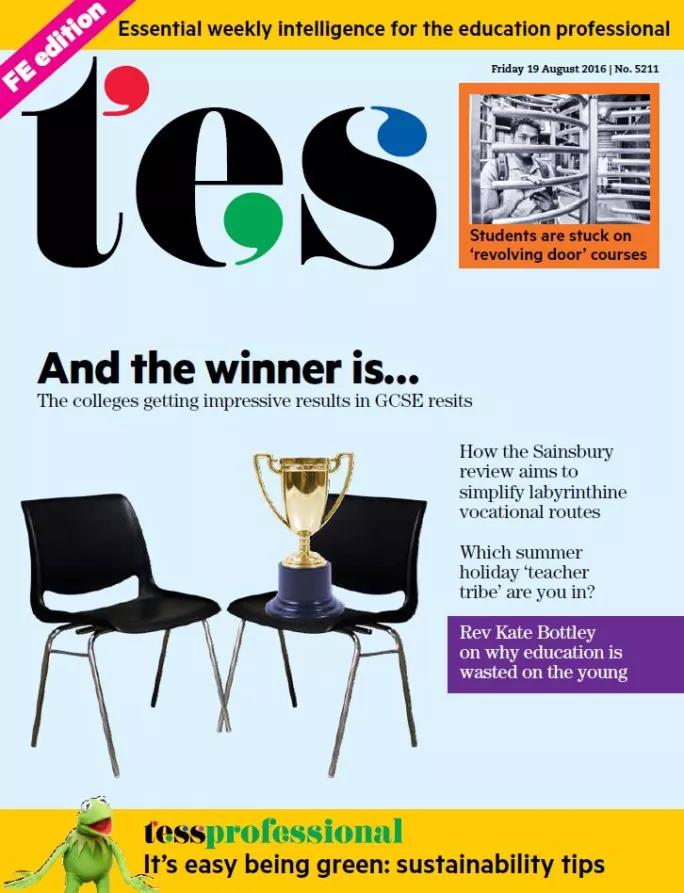- Home
- In this week’s TES Further: Which colleges have the best GCSE resit results?
In this week’s TES Further: Which colleges have the best GCSE resit results?

With less than a week to go until results are published for the largest ever cohort of students resitting GCSE English and maths, TES reporter Julia Belgutay reveals which FE institutions had the highest A* to C pass rate last year.
Her analysis suggests that some colleges with sizeable resit cohorts recorded grades that would be the envy of many schools. Data for the 109 colleges where more than 100 learners took GCSE English last year shows that 39 colleges beat the national pass rate. One such college, West Suffolk College, achieved seriously impressive results in English - some 82.5 per cent of its 137 students achieved a C grade or higher - while Central College Sussex recorded a pass rate of 50.4 per cent in maths.
Meanwhile, in his editorial, Stephen Exley says it is time that colleges braced themselves for GCSE results day. There has been a 40 per cent rise in the number of students taking English and maths in colleges, he reveals, and it’s difficult to overstate the challenges colleges face. But there is reason to be optimistic. Against the odds, colleges are facing up to the task at hand and delivering for their students - something they have done time and time again. “Here’s hoping that, whatever the overall picture, Thursday brings mores success stories for the sector to share,” Stephen writes.
Choices, choices, choices
Julia Belgutay reveals that thousands of 16-year-olds are stuck in an educational “revolving door”, according to research by the Centre for Vocational Education Research (CVER) at the London School of Economics (article free for subscribers). The research tracked a cohort of 575,000 teenagers for four years to find out what progress they made after GCSEs. The findings were stark: among the learners who sat GCSEs at the age of 16 in 2009-10, about 10,000 were found to be working towards low-level qualifications for four consecutive years.
Meanwhile, Sandra McNally, CVER’s director, asks what difference the Sainsbury Review will make for learners (article free for subscribers). “In my view, the weakness of the reforms is that 16 is a very young age for individuals to have a fixed view of occupational choices,” she writes. “Though the Sainsbury Review does suggest ‘bridges’ between academic and technical progression routes at age 18, there is nothing about experimentation with different routes or the possibility of a second chance for someone who makes a mistake.”
FErret
It seems that the skills plan - you know, that game-changing bit of policy that was going to result in the biggest overhaul of post-16 education since A levels - is now going ahead. Admittedly, it has been somewhat overshadowed by Britain’s impending departure from the European Union, but while everyone has been busy selling shares and weeping in a corner, Ofqual sneaked out a notice last week about its review of qualifications regulations in light of the plan. There’s only really one consequence that matters, reveals FErret (article free for subscribers): GCSEs and A levels are going to be virtually all about external assessment, while entry-level qualifications could go in the opposite direction. Sexy stuff.
Barriers to learning
Ros Morpeth, chief executive of the National Extension College, writes that barriers to distance learning may become insurmountable in the future (article free for subscribers). From May 2017, changes to the way science practicals, oral exams and coursework are assessed for GCSEs and A levels will give an estimated 50,000 private candidates a further hurdle to jump through. “Independent learners deserve to be greeted with welcoming arms, rather than have doors shut in their faces,” Ros writes. Could new education secretary Justine Greening be the person to show that the government is serious about the prime minister’s aspirations for the “just managing” and the “left behind”?
Which ‘holiday teacher type’ are you?
Perhaps you’re a “Netflix owl”, staying up late to watch the latest episode of Orange is the New Black - or maybe you’re the “Potterer”, never content with simply lazing around. From sipping reds in rural France to updating your laptop software, it takes all sorts to fill a few weeks off. Click here to see where you’d fit into the list.
Leave young, learn later
Education can be wasted on the young - according to TES’ resident reverend, Kate Bottley (article free for subscribers). She says that children should be allowed to leave school at 15 and get vouchers for education to cash in later. Older students - those having another go at education - “work harder and longer because they have learned just how important education is”. It’s certainly food for thought.
All this and much, much more in this week’s TES Further.

FE SPECIAL OFFER: click here to try out a TES Further Education subscription for just £1 for four weeks.
Want to keep up with the latest education news and opinion? Follow TES FE News on Twitter, like us on Facebook and follow us on LinkedIn
Keep reading for just £1 per month
You've reached your limit of free articles this month. Subscribe for £1 per month for three months and get:
- Unlimited access to all Tes magazine content
- Exclusive subscriber-only stories
- Award-winning email newsletters



